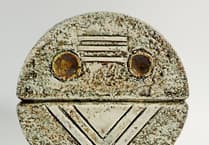RECENTLY, we sports fans have enjoyed two great world cups, writes Dave Kent.
Who knew that that Portugal and Chile played decent rugby, or that the Netherlands and Afghanistan could hold their own against more familiar international cricket countries?
There was of course a great local interest in rugby through the appearance of Wayne Barnes of Bream completing a stellar career in international rugby, refereeing the final of the rugby world cup.
I played the game for 30 years but only played once in the forwards, which is where the big rugby refereeing technical decisions are made.
This was in Jersey, on tour with Bream Rugby Club.
I was invited to play wing forward. I played with emphasis on the ‘wing’ rather than the ‘forward.
I never went into a scrum again.
This may have become apparent when I had to adjudicate on the mysterious underworld of front row play – the deeply offended ‘who, me, ref?’ from the penalised player, and ‘he’s been doing it all afternoon, ref’ from the other side.
Neither of these complaints were particularly supportive of the referee.
The laws (never called ‘rules’) of the game in respect of the scrum were not easy to interpret for a dilettante ex-back with a whistle.
The most difficult thing to do was to identify a culprit when the scrum collapsed.
I can now reveal that when I was unable to identify a guilty person but was convinced that some skullduggery had taken place, I invoked the old legal principle, ‘cui bono’.
This means ‘to whose benefit’, so you penalise a random player (usually a prop) from the side that would have gained from the offence, or reset the scrum if neither side had gained.
The ref couldn’t continue to reset scrums that kept on collapsing, so at some point I had to make an arbitrary decision to penalise one of the teams.
I was allocated matches under the jurisdiction of Gloucestershire RFC, so I could be refereeing anywhere in the county.
I have to say that Forest spectators and players are the most knowledgeable of rugby supporters, and can always identify a dodgy ref.
I still get an occasional good-natured greeting from an aggrieved Forest ex-prop.
There is a variant of rugby known as ‘Rugby Sevens’, seven a-side and seven minutes each way, 14 minutes of sheer distress.
If a player makes a break on his own goal line, and there may be no opposition player around to prevent an unchallenged 100 metre sprint to score at the other end, followed by an ageing referee who had to confirm that the ball had been touched down properly after this epic run, which could well be repeated a dozen or so times in a match.
Fortunately, as there were only 3 players on each side in a sevens scrum, the scrum engagements were brief and untechnical.
Especially as the scrum members were often backs who could sprint 100 metres but did not understand the laws of the scrum.
This was more suited to my skill set, and I was once invited to officiate at the world sevens championship in Hong Kong, which I alas had to decline.
In the 15 a side game, I reffed at a modest level, which was a great way of keeping in touch with the game, eventually retiring some years ago when I finally realised that it can’t be 30 rugby players wrong every Saturday.
It must have been me.





Comments
This article has no comments yet. Be the first to leave a comment.